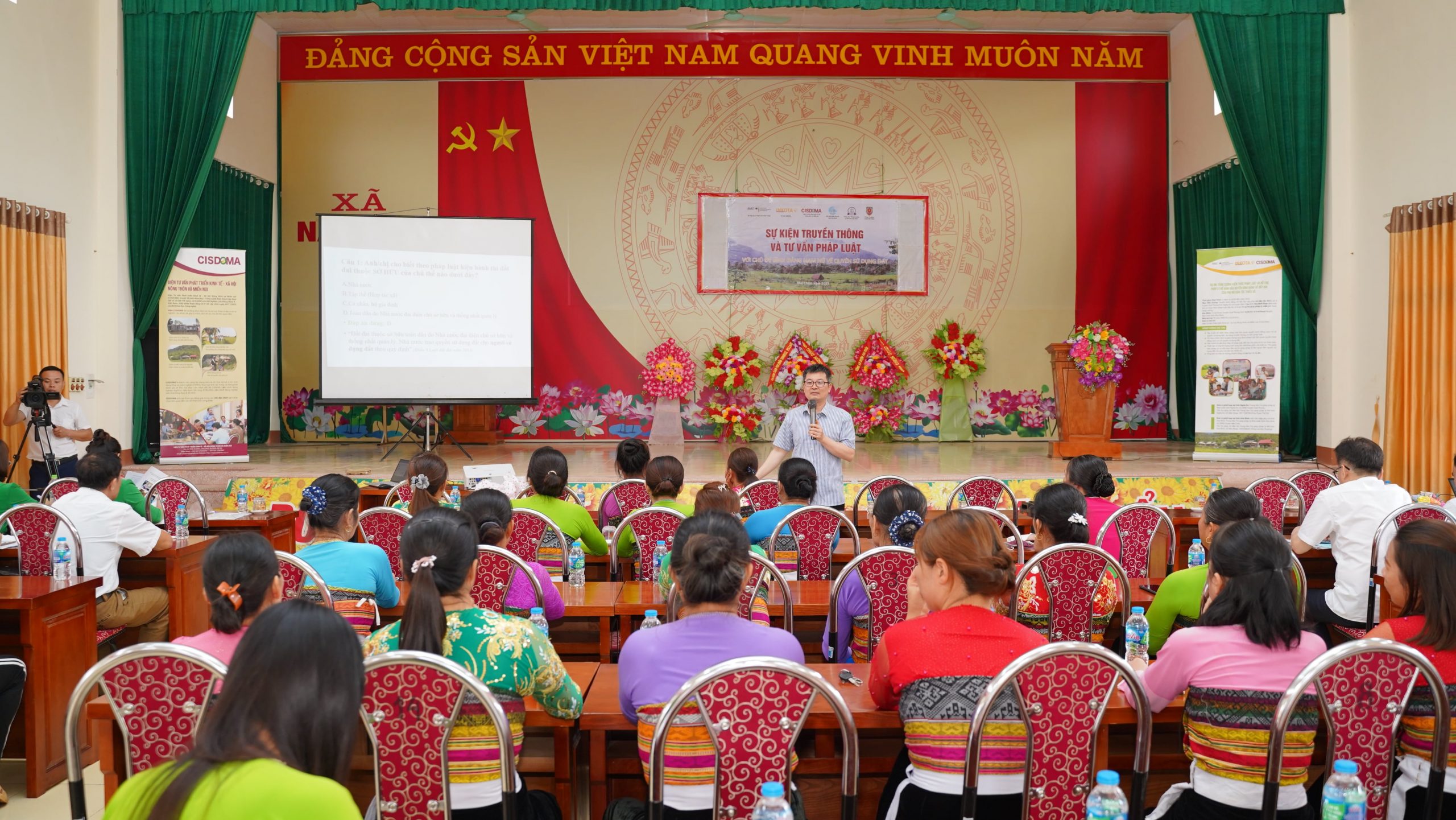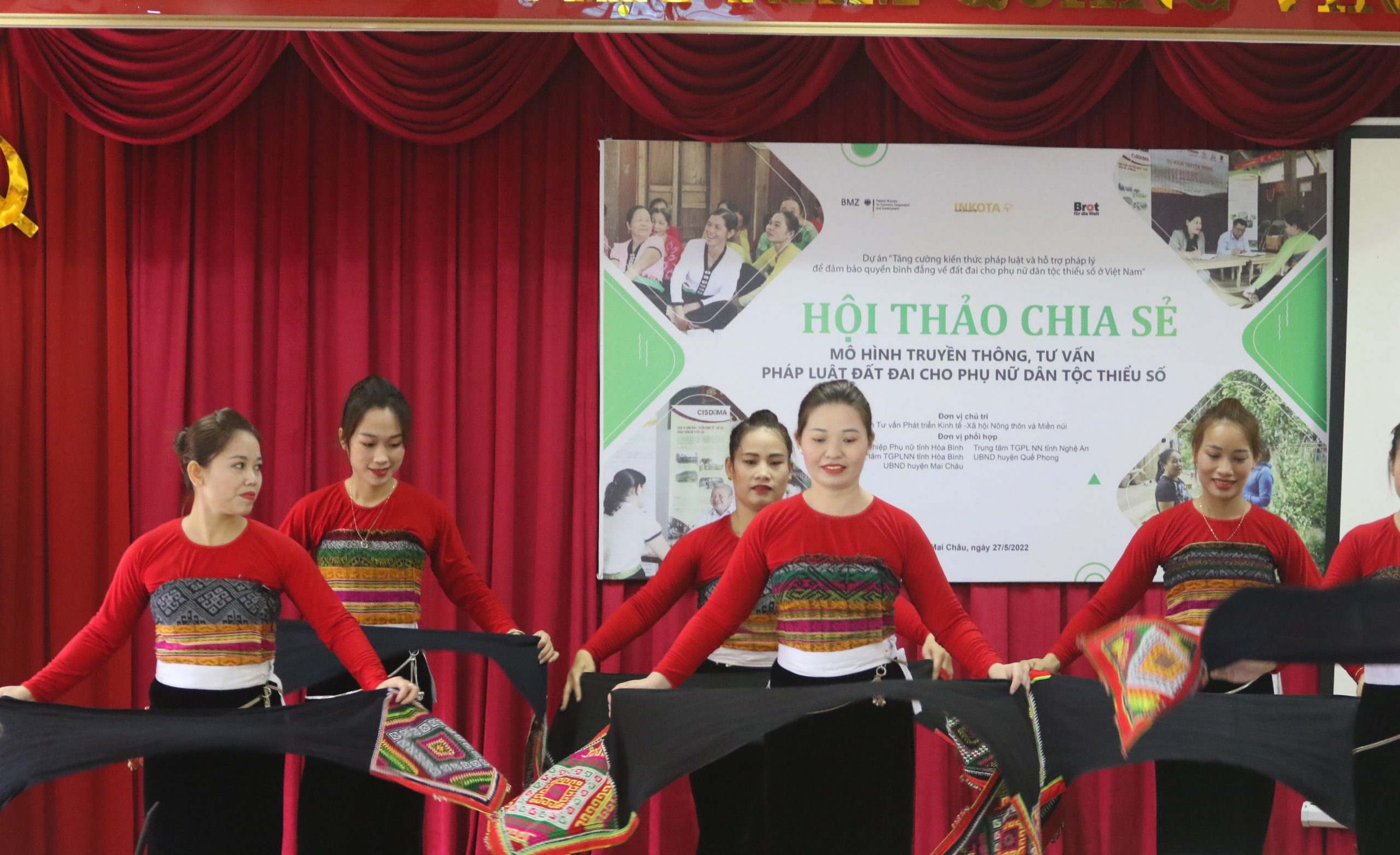On May 27, 2022, the Institute for Consultancy on Economic-Social Development in Rural and Mountainous Areas (CISDOMA), in collaboration with partner organizations, organised a workshop to share the communication model and legal consultancy on land for rural women. The workshop took place in Mai Chau district, Hoa Binh province, and was attended by nearly 70 delegates from central and local government agencies in the field of land management and women’s legal protection.
According to a report from the Ministry of Natural Resources and Environment released on May 20, 2020, up to now, the number of land use right certificates issued to households with joint land use rights or certificates issued for jointly owned property belonging to both husband and wife but only registered under the husband’s name nationwide is about 12 million. Thus, many women may not participate in decisions regarding land use rights within their families and may face the risk of disputes among family members on the husband’s side due to certificates not bearing their names.
The communication model and legal consultancy to ensure equal land rights for rural women have been implemented in 19 communes across two districts, namely Mai Chau District in Hoa Binh Province and Que Phong District in Nghe An Province, since May 2020. CISDOMA Institute led and coordinated with partner organizations, including the Hoa Binh Provincial Women’s Union, the State Legal Aid Centre of Hoa Binh Province, the State Legal Aid Centre of Nghe An Province, the People’s Committee of Mai Chau district, and the People’s Committee of Que Phong district, in implementing the model.

Local officials responsible for disseminating legal information or advising on land management have received enhanced legal knowledge related to gender equality in land use rights and communication skills, as well as legal consultancy skills. After the training, these officials collaborated to implement communication and advisory activities for local residents, especially women from ethnic minorities. To date, 3,579 people (of which 81.5% are rural women) who participated in the communication events in villages have gained a clear understanding of legal regulations related to the rights and obligations of land users, as well as gender equality in land use rights. 469 individuals (of which 51.4% are rural women) facing issues related to land ownership within their families or communities have received guidance on resolution methods. The main issues faced by individuals include obtaining new or updated land use certificates, transferring land ownership through inheritance, gifting, or transferring, and resolving land use conversion and disputes.
Communication events on legal regulations regarding gender equality in land use rights have been organised by legal experts in land law, lawyers, and legal aid officers in collaboration with local officials in villages. These events simplified the legal content and engaged participants through interactive methods such as question-and-answer games, situational exercises, and video clips. A set of questions and answers about women’s access to land rights as reflected in legal documents were integrated into specific life situations. Participants answered questions and shared experiences, and experts and officials supplemented and provided additional information. Mrs. Bui Thi Uon, a Muong ethnic woman from Panh hamlet, Bao La commune, Mai Chau district, Hoa Binh province, expressed her thoughts after participating in the communication event, stating, “Previously, I thought only sons could inherit the land, and land certificates could only be registered under the husband’s name, but now I understand the rights of both sons and daughters and land certificates can bear both the husband’s and wife’s names.”

Immediately after the communication event, those individuals facing legal issues regarding land were provided direct consultations at their homes to find solutions and receive further assistance. The specific issues and advisory information for each individual were recorded in Legal Consultation Forms. These forms were handed back to the individuals along with the contact information of experts and lawyers for further assistance if needed. Not stopping at the communication events, mobile advisory services were conducted as part of the campaign. Local officials trained in knowledge and skills provided initial consultations, guidance on the spot, and mediation, and connected individuals with lawyers and legal aid workers for cases where mediation was unsuccessful, to assist in the litigation process.
Mr. Ha Cong Nhuan, a judicial officer from Bao La commune, Mai Chau, Hoa Binh, stated, “Personally, I feel that I have gained more legal knowledge related to land, confidence, and communication skills to disseminate information to the community or provide on-the-spot advice. Previously, when guiding people, I only provided general information, but now I have a better understanding.”
With the aim of expanding this model to other areas, CISDOMA Institute is collaborating with the Vietnam Women’s Union to develop and issue a “Guideline for Implementing Communication and Legal Consultancy on Land for Women.” It is hoped that with this guideline, communication and consultancy activities will be more effectively implemented, helping many women ensure their rights and legitimate interests regarding land, as stipulated by the law.
